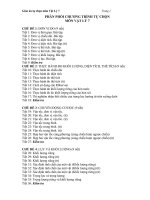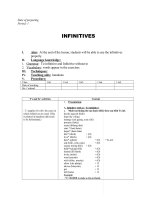Bài giảng GIÁO ÁN TỰ CHỌN AV 7
Bạn đang xem bản rút gọn của tài liệu. Xem và tải ngay bản đầy đủ của tài liệu tại đây (97.42 KB, 8 trang )
GIÁO ÁN DẠY TỰ CHỌN ANH VĂN 7
-------
Week: 1
Period:1+2
TENSE + COMPARISON
I.Grammar:
1.Tense: the simple present tense:
*FORM: S + V (s, es) S + DON’T/DOESN’T +V DO/DOES + S + V ?
*Adverd of frequency: always, usually, often, sometimes, never, everyday…
2.Comparative adjectives:
*Short adjective: Adj. + ER + than
Ex: This room is bigger than that one
Hoa is happier than Huong
*Long adjective: More + adjective + than
Ex: This story is more interesting than that one
Mai is more intelligent than Hoa
*Note: Some irregular adjectives:
Good better
Bad worse
Little less
Many/much more
Ex: Nam is better than Ba
3. How + Adj. : How old, How far, How many (much), How long, How often…
Ex: How old are you?
How far is it from your house to school?
EXERCISES
I. Make a complete sentence with the guided words:
1. the / I / in / live / country
2. Nam / name / his / is
3. again / see / nice / you / to
4. your / where / parents / do / live?
5. years / she / thirteen / is / old
6. that one / more / than / expensive / this book / is
7. is / how / from / your house / far / it / your school / to
8. is / my mother / oder / my father / than
9. students / are / in / many / there / your / how / class?
10. parents / I / my / live / with
II. Make a sentence with the underlined words:
1. Mai is thirteen years old
2. I go to school by bike
3. His parents live in the country
4. My house is two kilometers far from school
5. There are forty students in my class
6. Today is very cold
7. My father is a worker
8. There is a book on the table
9. I get up at five o’clock
10. My school is big
III. Read the passage then answer the questions:
Our summer holidays last three months. During the last week of the holidays we get ready for
school. We buy pencils, pens, papers, new books and copy books. On the first day of school we see
all our old friends again and we tell them about the holidays. After that we go into class. It is so hard
to keep quiet and pay attention to our teacher. He always says with a laugh, “You forget more in
three months than you learn in a year”
1. How long do our summer holidays last?
2. When do we prepare for school?
3. Who do we see on the first day?
4. What do we tell them?
5. Where do we go then?
6. What does our teacher always say?
2
Week 2
Period: 3+4
TENSE (CONT.) + NUMBERS + QUESTIONS
I. The simple future tense:
*It is used to express the actions happening in the future
*Form: S + SHALL / WILL + V
S + SHAN’T / WON’T + V
SHALL / WILL + S + V ?
*Adverbs of time: Tomorrow, next week ( month, year…)
Ex: I shall go to Nha Trang City next week
He will come to visit his parents tomorrow
I hope you will be better in the future
II. How to read the telephone number:
-Đọc như số đếm
-Hai chữ số trùng nhau: double
-Số không (o) đọc là: o(h) hoặc zero
III. How to write: date, month, year
-Viết theo thứ tự: Thứ, tháng, ngày, năm
Ex: Wednesday, December 1
st
2010
-Chú ý một số thứ tự thay đổi dạng
1. one the first (1
st
)
2. two the second (2
nd
)
3. three the third (3
rd
)
5. five the fifth (5
th
)
9. nine the ninth (9
th
)
20. twenty twentieth (20
th
)
* Tất cả các chữ số khác theo qui tắc thêm”th” sau chữ số đếm
*Các chữ số hàng chục theo qui tắc chuyển”y””i+eth”
EXERCISE
I. Answer the questions about yourself:
1. What’s your name?
2. What’s your date of birth? (When is your birthday?)
3
3. What’s your address? (Where do you live?)
4. What’s your telephone number?
5. What class are you in?
6. How do you go to school?
7. How often do you go to school?
8. Who do you live with?
9. How many people are there in your class?
10. What do they do?
II. Interrogative form:
A. Yes, No questions:
1. To be: Am, is, are + S ….? Yes, S + be / No, S + be not
2. Aux. verbs (Can, may, must, will, shall…) + S + V ?
Yes, S + Aux. verb / No, S + Aux. not
3. Ordinary verbs: DO / DOES + S + V ?
Yes, S + do/does / No, S + don’t / doesn’t
Ex: a. Are you a worker? Yes, I am / No, I amnot
b. Will he come home tomorrow? Yes, he will / No, he won’t
c. Do they play soccer after school? Yes, they do / No, they don’t
B. “Wh-“ / “H-“ questions
*When, where, what, when, who, why, which, what time…
*How, How often, How far, How long, How old, How many (much)……
Ex: Where do you live?
What do you usually do after school?
What time do you usually get up?
When do your classes start?
How often do you go to school?
How far is it from your house to school?
How many students are there in your class?
4
Week 3
Period: 5
TENSE (CONT.) + STRUCTURES
1. The present progressive tense
*Form: S + AM, IS, ARE + V-ING S + AMNOT, ISN’T, AREN’T + V-ING
AM, IS, ARE + S + V-ING
* Adverb: now, at this time, at this moment, look! Listen! Hurry up!
Ex: My father is working in the garden now
They are playing tennis at this moment
What are you doing now? I am reading a book
2. Structures:
a. S + be + adj. + to-inf.
Ex: It’s very interesting to take part in the school football team
I’m very happy to meet you again
b. like, enjoy, start, begin, finish, look forward to… + V-ing
Ex: I like playing volleyball
They enjoy studying English
We finish doing homework
I’m looking forward to hearing from you
c. Would like, need, want..+ to-inf.
I would like to go to the movie theatre
I need to buy a stamp
He wants to send this letter to HCM city
d. What about + V-ing
Ex: What about playing marbles
What about going to Hoa’s house
e. Let’s + inf.
Let’s speak English in class
Let’s go for a walk
f. Phrases:
-Play (soccer, volley ball, table tennis, tennis, basketball, badminton, marbles…)
-Go (fishing, shopping, sailing, hunting, swimming…)
5









